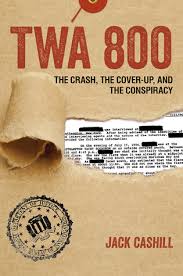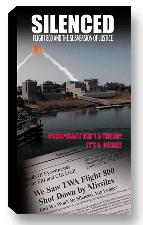Did Christopher Steele Write His Dossier or Did a Russian Associate?
![]()

Order Jack Cashill's latest book, TWA 800: The Crash, the Cover-Up, and the Conspiracy
![]()

About Silenced: Flight 800
and the Subversion
of Justice (DVD) -
-Buy the Silenced DVD-
![]()
© Jack Cashill
January 19, 2018 - AmericanThinker.com
Among the very few givens in the unfolding drama of alleged Russia-Trump collusion is that former MI6 intelligence officer Christopher Steele wrote the Donald Trump-Russia dossier alternately known as the “Steele Dossier.”
This is the notorious document that purports to detail “Republican candidate Donald Trump’s activities in Russia and compromising relationship with the Kremlin.”
The above quote is from the subhead of the document titled “Company Intelligence Report 2016/080.” Yet the very subhead hints at a disturbing pattern evident throughout the document: it appears to be written by someone whose native language is something other than English.
The phrase should read, “Republican candidate Donald Trump’s activities in Russia and his compromising relationship with the Kremlin.” As shall be seen, it is hard to believe that Christopher Steele actually wrote the original phrase or much of the rest of the eponymous dossier.
Christopher Steele, or “Chris Steele” as he bylined his reporting, attended Cambridge University and wrote for the student publication, “Varsity.” At Cambridge, he also served as president of the Cambridge Union Society, a debating club.
Contemporaries remember him as an “avowedly Left-wing student with CND credentials.” CND is shorthand for “Campaign for Nuclear Disarmament,” a British organization that was particularly active when Steele arrived at Cambridge in the early 1980s. At the time, MI5 monitored CND for its reported communist ties.
As the British Guardian observed in an article on Steele, “Cambridge had produced some of MI6’s most talented cold war officials. A few of them, it turned out – to great embarrassment – had secret second jobs with the KGB.” But this is a story for another day.
The story for today is how a Cambridge journalist and debater could write a sentence like the following: “Alpha held ‘kompromat’ on Putin and his corrupt business activities from the 1990s whilst although not personally overly bothered by Alpha’s failure to reinvest the proceeds of its TNK oil company sale into the Russian economy since, the Russian president was able to use pressure on this count from senior Kremlin colleagues as a lever on Fridman and AVEN to make them do his political bidding.”
The articles we have unearthed from Steele’s tenure at Varsity read like someone who knew his own language. Much of the Steele Dossier reads like the sentence above, a syntactical nightmare with a near random use of punctuation.
The author of the dossier was, however, schooled in British English. The document contains distinctly English usages such as “programme,” “defence,” “authorised,” and “manoeuvre.” The use of such words as “regime,” “apparatus,” and “compatriot” indicates someone fluent in cold war terminology.
That said, too many of the sentences read as though written by an individual not fully fluent in English, British or American. Here is one of several: “Trump’s previous efforts had included exploring the real estate sector in St. Petersburg as well as Moscow but in the end Trump had had to settle for the use of extensive sexual services there from local prostitutes rather than business success.” The very idea of linking “sexual services” and “business success” is jarring as is the stand-alone use of “business success.”
There are several basic misuses of the language that should have cautioned officials who read this document. One sentence, for instance, begins with the phrase, “Speaking to a trusted compatriot.” After parsing the sentence it becomes clear that the author meant, “According to a trusted compatriot.” The “speaking to” misdirection makes a jumble out of the sentence.
In writing about sex the author is particularly maladroit. He famously claims that Russian authorities had compromised Trump by catching him in his “personal obsessions and sexual perversion.”
In one instance, Trump was alleged to have gotten revenge on the Obamas “whom he hated.” He did this by “defiling the bed where they had stayed on one of their official trips to Russia by employing a number of prostitutes to perform a ‘golden showers’ urination show.” The common phrase is “golden shower,” and what native English speaker would say, “‘golden showers’ urination show”?
Another discordant pattern throughout the dossier is the absence of an article where one expects to see one. For instance, the phrase “to encourage splits and divisions in western alliance” is missing a “the” before “western alliance.” The phrase “anchored upon countries’ interest” should read, in context, “anchored upon the country’s interest.” More than once, the author misuses the possessive as he does here.
The punctuation is bewildering throughout the dossier. As a case in point, several sentences begin with the word “However” without a following comma: “However it has not as yet been distributed abroad.” In other instances, the “However” is followed by a comma: “However, there were other aspects . . . . “ The latter is correct. On the use of commas before or after conjunctions such as “and” and ‘but,” there is no consistency whatsoever.
It is possible that the document had more than one author, one perhaps Russian, one most likely Steele. At one point, the reader is told the Trump campaign leaked the DNC documents to Wikileaks “to swing supporters of Bernie SANDERS away from Hillary CLINTON and across to TRUMP.” The “summary” section straightens out the language. Now the goal is to switch voters “away from CLINTON and over to TRUMP.”
There are many other little details that bug the reader. The author writes, “Things had become even ‘hotter’ since August on the TRUMP-RUSSIA track.” Why put “hotter” in quotes? It is much too common a metaphor to demand that kind of attention.
What is most disturbing is that no one in the media appears to have reviewed the language of the dossier. Whether the primary author is Steele or a Russian associate, the dossier is a mess, both in its content and in its style.
A former KGB spy who defected to the United States, Konstantin Preobrazhenky, did not feel qualified to assess the language of the dossier. English is not his first language. As to content, however, he told us, “There is no information in the dossier whatsoever. It’s just foolish speculation. There are no references. It is not an intelligence document of any kind. I was laughing when I was reading it.”
One content point that reasserts itself repeatedly towards the end of the document is the notion of “Moscow’s interference in the US Presidential election campaign.” Another is Trump’s perceived “unfitness” for office. Jammed in out of nowhere, these assertions read less like Russian intel than like Democratic talking points.
The question remains: who did the colluding? Was it the Trump campaign or the Clinton campaign? Much hinges on the authorship of this dossier. The media have an obligation to ask who else was involved in its creation. If Christopher Steele wrote it himself, Cambridge should rescind his degree.
Joel Gilbert & Jack Cashill
